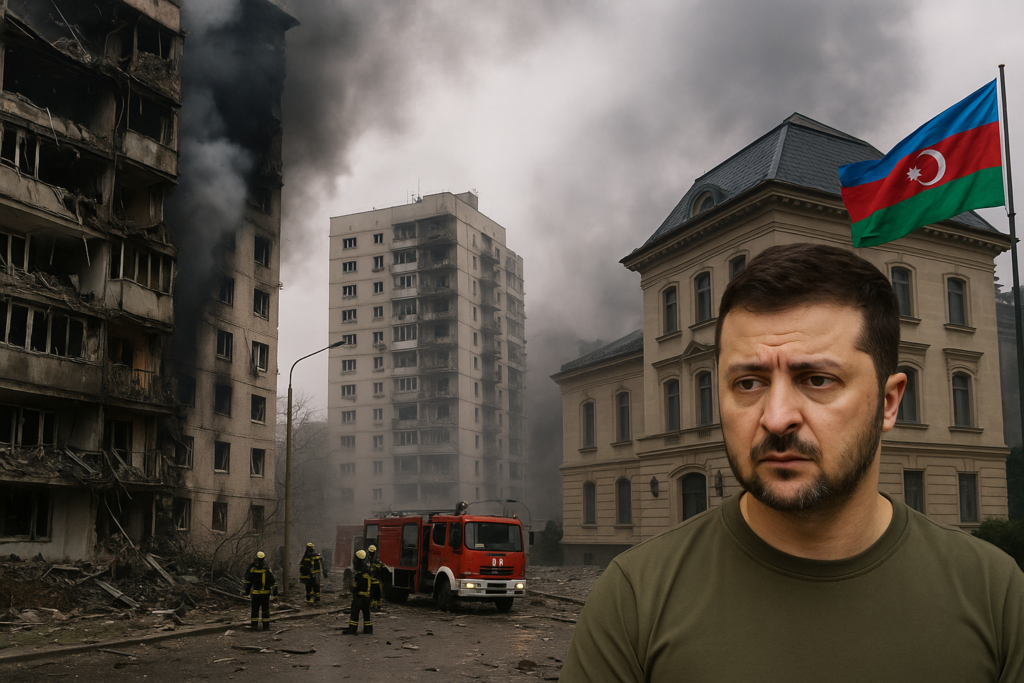A deadly Russian missile strike kills civilians in Kyiv, damages Azerbaijan’s embassy, and coincides with a major corruption scandal—deepening political tensions and raising global concerns over Ukraine’s wartime stability.
By Imran Malik | MediaBites
Massive Russian airstrike on Kyiv kills at least six, injures dozens
KYIV — A devastating overnight Russian barrage struck the Ukrainian capital, killing at least six civilians — including two children — and injuring more than three dozen. Residential buildings across several districts were hit as more than 400 drones and nearly 20 missiles rained down on the city.
The explosions triggered fires, shattered glass across entire blocks, and sent families rushing into underground shelters. Emergency teams said most of the victims were “ordinary citizens in their homes” and warned the casualty count could rise as rescue operations continue.
Ukrainian officials accuse Moscow of deliberately targeting residential neighbourhoods to terrorize the population and weaken morale. They argue that the pattern of strikes on non-military areas leaves “no ambiguity” about intent. Russia, however, reiterated its claim that it only targets military-industrial and energy facilities.
For Kyiv’s residents, the question lingers painfully: What was the fault of those killed? They were not soldiers, nor near military sites — simply citizens living their daily lives amid a war entering its fourth year.
Ukrainian diplomats say they expect the United Nations to raise the issue in upcoming sessions and accuse Russia of repeated violations of international humanitarian law. Whether the UN takes concrete action remains uncertain, as geopolitical divides have slowed previous attempts.
Azerbaijan protests to Russia after embassy compound damaged
The overnight assault also caused unexpected diplomatic fallout. Debris from one of the missiles landed inside the Azerbaijani embassy compound in Kyiv, damaging its perimeter wall, administrative block, consular office and parked vehicles. No injuries were reported among embassy staff.
Azerbaijan formally summoned the Russian ambassador to lodge a strong protest, calling the incident “unacceptable” and warning that diplomatic missions must remain inviolable even in times of war.
Whether the strike was accidental or targeted remains unclear. Ukrainian officials suggest the impact was caused by falling missile fragments rather than a direct hit. Russia has not issued a detailed explanation, only repeating its broader claims about the intended targets of the attack.
The event raises serious questions under the Vienna Convention, which requires all warring parties to avoid placing diplomats at risk. Even an accidental strike can escalate tensions, particularly with a country that maintains relations with both Moscow and Kyiv.
Major corruption probe shakes Kyiv: ex–deputy prime minister targeted
Compounding Ukraine’s challenges, investigators have opened a sweeping corruption case involving a $100 million kickback scheme within the state nuclear sector. Authorities are now seeking to arrest a former deputy prime minister and several influential figures, some of whom have long-standing personal or business ties to President Volodymyr Zelensky.
The timing of the scandal is politically explosive. With Ukraine reliant on international aid and military support, corruption allegations at senior levels threaten both Zelensky’s domestic credibility and the trust of key allied nations.
Although the president has distanced himself from the accused and encouraged a full investigation, critics argue that multiple members of his inner circle facing scrutiny could damage the reformist image he has projected since taking office.
Allied governments have responded cautiously. While publicly reaffirming support for Ukraine’s war effort, several partners privately emphasize that continued assistance depends on Kyiv demonstrating real progress on transparency and rule-of-law reforms. Failure to act decisively, they warn, could complicate future aid packages and undermine Ukraine’s bid for deeper integration with Western institutions.
Bottom line
Ukraine faces a dual crisis: intensifying Russian aggression from the skies and mounting internal pressure from a corruption scandal touching high office. As civilians continue to bear the brunt of the war and diplomatic tensions rise — including over the strike on Azerbaijan’s embassy — Kyiv must now battle both external and internal threats to its stability, unity, and international standing.



4 Comments
Really insightful post — Your article is very clearly written, i enjoyed reading it, can i ask you a question? you can also checkout this newbies in classied. iswap24.com. thank you
Thanks for sharing. I read many of your blog posts, cool, your blog is very good. https://www.binance.com/register?ref=IXBIAFVY
Thank you for your sharing. I am worried that I lack creative ideas. It is your article that makes me full of hope. Thank you. But, I have a question, can you help me?
Thanks for sharing. I read many of your blog posts, cool, your blog is very good.